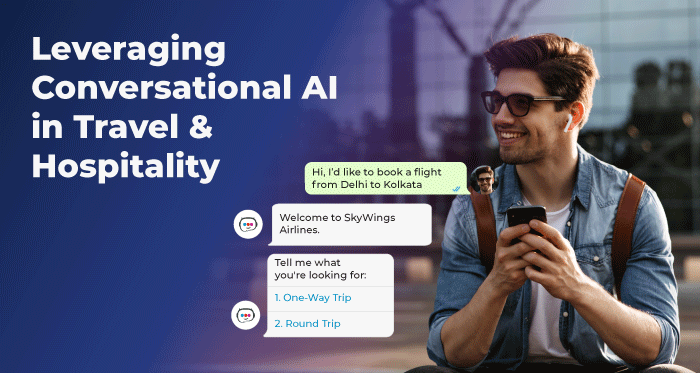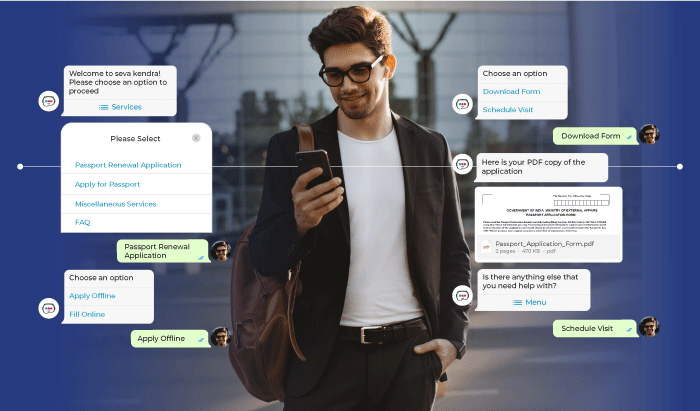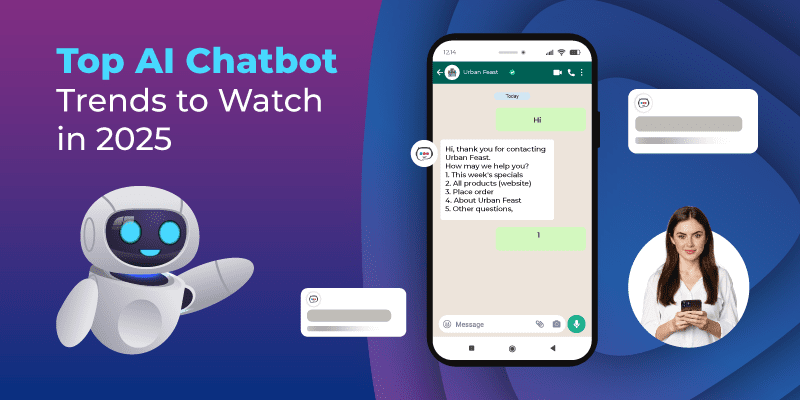Table of Contents:
Every industry needs to accommodate the high level of customer support requests. However, in the travel and hospitality industry, being able to respond faster and be available around the clock is imperative.
Customers are the core of the Travel & Hospitality industry. The grandeur of your hospitality and level of customer care define your hospitality, translating into your brand value and differentiation.
Among the top three considerations for travelers when choosing a travel or hotel company, customer service seems to be their top priority (60%), followed by the easy-to-use website (50%) and online reviews(55%).
Poor customer experience, delayed responses, and negative reviews have an apocalyptic impact on a travel or hotel business.
An over-dependence on traditional methods is not enough in today’s competitive landscape, where businesses are leveraging technological advancements like Artificial intelligence to reach out, retain, and convert prospects into customers.
Especially in travel and hospitality, conversational AI emerges as a game-changer when it comes to interacting with customers.
This article investigates how travel and hotel companies leverage conversational AI and how it revolutionizes the industry.
The Applications of Conversational AI in Travel & Hospitality
With rapid AI adoption, conversational AI, voice assistants, chatbots, and hyper-personalized targeting have become vital for businesses. In fact, Conversational AI can handle 68.9% of chats from start to finish, achieving almost a 90% completion rate with customers.
Following are these applications of conversational AI that travel companies and hotels are adapting to leverage conversational AI in the travel & hospitality industry.
Seamless Reservations & Booking Assistance
The travel and hotel industry uses conversational AI to help guests make hotel reservations.
Guests converse with chatbots, sharing their likes, dislikes, and preferences, and receive assistance checking availability and booking the best room.
The conversational AI can study past bookings and queries of the guest, their responses, social media activities, online behavior, and much more to personalize their recommendations.
24/7 Customer Service & Online Support
90% of businesses witnessed faster complaint resolution due to conversational AI chatbots. Many hotels, tour operators, and travel agencies use conversational AI to facilitate 24/7 customer service and support.
AI’s ability to quickly respond to customers’ queries without any delay enhances customers’ experience. By 2027, 25% of organizations are predicted to rely on AI chatbots for their customer service and online support.
Our experts at Route Mobile believe the adaptation of chatbots for customer support and marketing will be much more generous in the near future, especially in integrating social media and messaging platforms like A2P messaging.
Data-based Personalized Recommendations
Conversational AI tools like chatbots collect voluminous amounts of customer data, including their history, customer journey, behavior, and online activities.
This allows them to utilize the information to offer personalized recommendations tailored to customers’ preferences and needs. Data-driven personalization also helps optimize customer care to its full extent.
It includes suggesting activities, hotels, restaurants, packages, insurance, hotel rooms, and more. AI can predict customers ‘ interests or actions based on the same data. For example, when and where they would be traveling next.
Also, intelligent recommendations like suggesting the number and size of rooms depending upon their budget, number of guests, etc. The idea is to strike a chord with the potential buyer for better conversions, upselling, cross-selling, and overall top-level guest satisfaction.
Also Read: Understanding CPaaS: Benefits, Use Cases, and Tips for Selecting the Right Provider
Brand Management
Online reviews are still proven to be a trusted source based on which a customer chooses a travel or hotel company. Managing negative reviews has always been a challenge for companies anyway.
However, conversational AI tools help track customer reviews and comments on social media across the web. It quickly analyzes and auto-responds to negative feedback to improve customer/guest satisfaction and build brand loyalty.
Conversational AI embedded as chatbots through RCS business messaging for more effective and intimate communication. Analyze the feedback loops and reviews to identify gaps where much improvement is needed.
Boost Guest Loyalty Programs
With capabilities such as NLP, sentiment analytics, self-learning, and generative AI integrated into the voice user interface, conversational AI can revolutionize guest interactions.
67% of travelers are interested in staying in hotels that use AI to offer personalized services. Also, 36% of guests would rather opt for contactless guest service, where AI assistance is integral.
AI-powered chatbots can satisfy the maximum guest queries, offer personalized recommendations, and help process loyalty rewards by analyzing customer behavior, past purchases, travel records, or other preferences. They can provide tailored incentives and hyper-personalized rewards to boost guest loyalty.
Further, using their sentiment analysis, they can attend to customer complaints, analyze feedback, and respond in a way that accommodates their negative experiences and turns them into positive experiences. Not to mention, emotional intelligence in AI will be more sophisticated in the future.
Intelligent Virtual Assistance & Smart Hotel Rooms
More and more hotels are installing intelligent virtual assistants in their hotel rooms.
Conversational AI is brilliantly used for self-check-in and check-outs, requesting room service, placing orders, and requesting cleaning or staff.
This not only reduces the efforts, time, and resources dramatically but also minimizes human contact.
For example:
Airbnb leveraged conversational AI technology gracefully during a pandemic, which stays so relevant today as well. They increased the efficiency of self-help for guests across their many establishments, removing almost half of their staff. Such an excellent display of AI applications in the hotel industry!
Then, there are smart hotel rooms featuring electrical appliances and gadgets linked to AI virtual assistance and other AI-driven technologies for a better guest experience.
AI-Powered Chatbots
34% of consumers find AI-powered chatbots actually helpful for customer service, while 43% believe there is room for improvement.
The chatbots are available 24/7 and are more efficient, cost-effective, scalable, and automated solutions for customer service and engagement for a brand.
These chatbots feature NLP, enabling them to better understand user intent and sentiment, identify negative and positive emotions, and can be used in multiple applications in the travel and hospitality industry.
They are also equipped with context awareness and offer personalized content, increasing brand awareness.
Capitalizing on Anticipation With Pre-Arrival Engagement
As stated earlier, Conversational AI can be leveraged to optimize every stage of a guest journey.
Pre-arrival has to be the most underutilized stage for travel and hotel companies. Many brands are now using AI to capitalize on the anticipation of the guest’s arrival.
They create automated systems to offer helpful suggestions, making their arrival convenient. With that, it maximizes the opportunities for upselling and cross-selling through hyper-personalized interactions.
It also brings social media and more intimate messaging apps like WhatsApp for faster interactions and resolving queries using WhatsApp business API services.
Hyper-personalization Retargeting
Since conversational AI can access the customer journey, purchase history, social media activities, preferences, likes, and dislikes, it can hyper–personalize customer interactions.
It enhances the quality of individualized interactions with hyper-personalized messages.
This further leads to extraordinary customer experience where every message deeply caters to an individual’s needs and preferences.
To craft automated, effective, and individualized communication strategies with further segmentations, hyper-personalized retargeting campaigns use:
- real-time AI-driven data analysis
- user behavior
- User profiling
- And other data
Also Read: How RCS is Changing the Future of Travel Bookings
Pre-Booking Travel Assistance
According to HiJiffy’s 2023 report, where they analyzed 1.7 million guest queries through conversational AI, found out that all those questions can easily be categorized into five sections, that are:
- General information
- Booking and reservations
- Policies and procedures
- Amenities and facilities
- Services and special offers
This clearly demonstrates how powerful conversational AI-customized chatbots can be to answer frequently asked questions based on required input data.
The same report shares how conversational AI empowers guest communication hubs to successfully resolve more than 80% of guest queries on their own without any human staff intervention.
AI Integration With RCS Business Messaging
AI features NLP that empowers RCS chatbots to understand the intent and context of the conversation. It makes them more natural, engaging, personalized, and conversational interactions for prospects and customers.
Through AI integration, businesses can leverage automated RCS business messaging using channels like WhatsApp to perform strategic communication workflows, reducing manual tasks and saving time, effort, and resources.
Read This: Ramp Up Your Business Communication: Embrace RCS Business Messaging Today
Conclusion
The significance of 24/7 availability, high response time, and customer support in the travel and hospitality industry is evident. This is also very well reflected in the branding and sales of travel and hotel companies.
Conversational AI not only accommodates this demand on a large scale but also takes it to another level through AI chatbots, hyper-personalized targeting, automated customer support, and others.
AI technology has proven to be a boon to the travel and hospitality industry, with a promising future of efficient traveling and exceptional guest experience.
We at Route Mobile, a leading cloud communication platform offering Communication Platform as Service (CPaaS) to leverage chatbots and AI automation through messaging platforms.
The platform allows businesses to optimize travel and hotel businesses’ customer service and marketing strategies. Contact our team to learn more about our products and services.
FAQs
What are the Key Components of Conversational AI?
The critical components of Conversational AI are text analysis, natural language processing (NLP), machine learning (ML), and sentiment analysis.
What are the Benefits of Conversational AI?
Conversational AI offers high customer satisfaction, improves guest experience, reduces cost, effort, and labor, and boosts revenue for travel and hotel businesses.
How Do Travel & Hospitality Companies Leverage Conversational AI for Sales?
Travel and hospitality companies leverage conversational AI to enhance the customer experience and journey. From reaching out to post-journey engagement, this includes personalized recommendations, travel/hotel assistance, 24/7 customer support, and more. It simplifies, streamlines, and automates the user journey experience to improve guest experience. This helps them achieve high customer satisfaction, leading to more sales.







